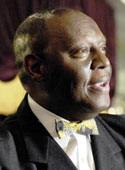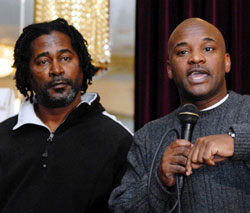By Richard Muhammad

CHICAGO (FinalCall.com) – The Grand Ballroom of the Salaam Conference Center was full early on a recent Saturday morning as ex-offenders, their family members and advocates gathered for a discussion of obstacles faced upon release from prison, and ways to overcome those challenges.

The Dec. 2 forum was sponsored by Prison Reform Inc., a not-for-profit run by Minister Abdullah Muhammad, head of the Nation of Islam National Prison Reform Ministry.
The session opened with guests treated to coffee, juice, danish and sweet rolls. But it was clear from the opening speaker that those involved wanted more than a run-of-the-mill session.
A major point stressed from the outset: The estimated 850,000 ex-offenders in Illinois need to speak for themselves and exert influence over public policy and political decisions that affect their lives.
After remarks from Min. Abdullah, members of the audience had an opportunity to voice concerns. As ex-offenders spoke, several themes emerged, including the need for better service delivery and training, the problem of employment applications that require admission of felony convictions, the need to rein in corrupt cops, the value of self-discipline and control, and the importance of working together. There were also expressions of desires to move forward and leave past negative activity behind.
Examples of reform shone through as Muslims working with Min. Abdullah talked about their time in prison and how Islam changed their lives. It’s time to change more lives, they said. Other ex-offenders showed that their prison records didn’t reflect the full measure of who they were.
The main presenters were ex-offenders who have gone on to important work, including Melvin Bailey of the Community Male Empowerment Project; Melvin Haywood of the Chicago-based Safer Foundation; and Xavier Williams, a former outreach worker for the Ceasefire anti-violence program. Ex-offender advocate and State Representative Connie Howard was also present for the daylong discussions.
Mr. Haywood talked about his work in encouraging inmates and ex-offenders to take advantage of any opportunity offered. He counsels ex-offenders and now works with them as clients through the Safer Foundation. He also reaches out to employers to try to obtain jobs.

Mr. Bailey shared the story of how his group went from protesting and demanding jobs for Black men at neighborhood construction sites to recently breaking ground for an affordable housing project on the West Side of the city. His group is building two- and three-flat buildings. The project will hire and train ex-offenders for jobs in the construction trade, Mr. Bailey said. He hopes to expand into other areas of Chicago.
The idea is to hire and train ex-offenders to rebuild the areas where they live, he explained. The developments also connect with Black History by taking the names of historic figures like abolitionists Harriet Tubman and Frederick Douglass.
Mr. Williams discussed the need for effective work re-entry programs and the need for research into labor markets and labor force projections to decide what careers ex-offenders should pursue. He argued success has to mean more than just a low wage in a dead-end job–and shared research to prove it. The young man, who earned a college degree while in prison, developed an employment assistance program in a partnership between Ceasefire and the Safer Foundation.
The great majority of the ex-offenders who participated in his program chose education options for long-term careers when it was offered, he said.
“You might want to feed us hamburger, but if you feed us steak, some of us may chose steak,” Mr. Williams said, insisting that options for ex-offenders need to look beyond immediate needs of food, clothing and shelter.
Some are willing to forego immediate employment in favor of education, if the education leads to long-term gain, he said.
He also echoed others who want to see an end to what they call discrimination against ex-offenders. In several states, he noted, laws have been passed that protect ex-offenders from discrimination. The same can be done in Illinois, if people are willing to come together and work at it, he said.
Rep. Howard listened intently to forum participants before it was her turn to take the microphone. When she spoke, the Black lawmaker talked about the challenges she has faced trying to help ex-offenders.
She has been a leader in trying to change Illinois laws that make life tougher for those who have paid their debt to society. She has authored or supported legislation that allows for the expungement of records for some non-violent, misdemeanor crimes and pushed a resolution that calls on the state legislature to investigate barriers to successful re-entry into society.
Rep. Howard said her legislative activity grew out of concerns expressed by constituents, but opposition to changes in laws affecting ex-offenders has been fierce.
Black lawmakers, who hold fewer than 30 seats, may support changes, but must convince White colleagues to support bills in order to pass new laws, she added.
The politician talked about her work with Chris Moore of the Exodus Renewal Society, to craft a law prohibiting discrimination against ex-offenders. Mr. Moore, who was present, also had a lawyer on hand to hear and document charges of discrimination from ex-felons.
If someone has had a clean record for 10 years, their record should be cleared, said State Rep. Howard. She also asked the audience to support new legislation to end time limits on when victims of torture could pursue charges against police officers.
Min. Abdullah, who concluded the session, told participants that a “selfless” attitude was needed in order to be successful. Just because a state law may not help in the case of a felony, it doesn’t mean that those who can get their records cleared should not do so, he said. That means a door-to-door, neighborhood-by-neighborhood campaign to inform ex-offenders, he stressed.
He also called on the audience to support State Rep. Howard’s bill to hold police accountable for torturing Chicagoans arrested or accused of crimes.
We have the power to make change, Min. Abdullah said, and need to unite and get started.












